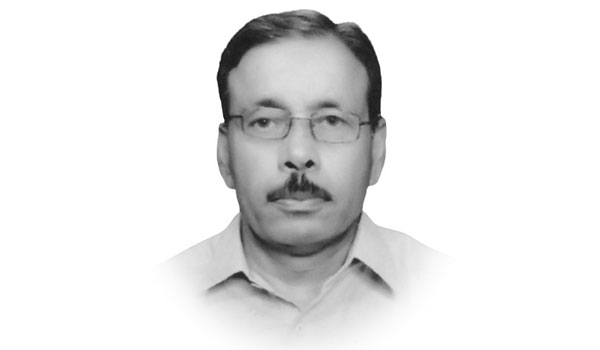A lesson from history
We achieved this land through a peaceful political movement.Had All India Muslim League not got landslide victory in the 1946’s elections, we could never have it.
Thus, for its survival, genuine democracy is a sine qua none.Our track record on the count is however not what we should be proud of. The nascent state fell victim to a series of conspiracies.The first plot surfaced with an attempted overthrow of legitimate democratic government in March 1951.
However, when this attempt was spoiled, the same very year in October, another successful punch was delivered at while the first premier Liaquat Ali Khan was martyred.
He was close companion of Quaid and had capability to bring the country out of whatever critical situation it might come across or even plunge into.
So, after removal of his iconic personality from the scene, that began what was to happen.The worst kind of political chaos and anarchy prevailed during the next seven years.The parliament stood toy in the hands of undemocratic forces.
Ghulam Muhammad, Iskander Mirza and Ayub Khan, all from Civil and Military bureaucracy, got sheltered successively in office of the Governor General and played havoc with the democracy.
During that period, six prime ministers, Khwaja Nazimuddin, Muhammad Ali Bogra, Chaudhri Muhammad Ali, H S Suhrawardy, I I Chundrigar and Malik Feroz Khan Noon, were brought and sacked.
Consequently, financial disorder, corruption, smuggling, food crises and other social menaces were features of that period.
While the then establishment was responsible for the chaotic and anarchical conditions so created, the then political leadership too was no less responsible for the same.
They exercised no wisdom either in governance or in countering whatever crisis the country did face.
Governor General Khwaja Nazimuddin down-stepped from his office to that of prime minister vacated by Liaquat Ali Khan and, in his place, brought Ghulam Muhammad, a veteran civil servant.
The politically enriched Khuwaja was well in the know of the Governor General’s power to dispense with the government or dissolve the assembly under the Government of India Act, 1935 but did commit the blunder of down-stepping.
He bore the brunt of this blunder when the same Ghulam Muhammad first dispensed with his ministry and then dissolved the Assembly in 1954.
This act was moved against in the Supreme Court, however, Justice Munir’s infamous verdict whereby the plea was dismissed formed yet another dark part of our history.
In 1955, Iskander Mirza, another bureaucrat, replaced ailing Ghulam Muhammad who, in 1958, left reigns of government totally to Field Marshal Ayub Khan, the then Commander-in-Chief of Army.
Ayub’s Martial Law was first of its nature that evoked three other Martial laws each having an irremovable stigma on the forehead of the country.
He prolonged his stint of power for as long as eleven years.His certain political decisions created a deep sense of deprivation in East Pakistan that subsequently proved detrimental to the country’s integrity.
Then, he handed over power to yet another military autocrat Yahya Khan whose dictatorial regime witnessed fall of Dacca in 1971.
Such actions on his part eroded his credibility substantially and thus his tenure is not remembered in positive sense.
General Zia-ul-Haq’s military coup was provoked by the anti-Bhutto movement in 1977.The objective behind was to hold fair and transparent elections within three months.
But, instead, he clinched to power till his death in the air crash in 1988.His authoritarian tenure featured three things.
First, an elected prime minister, Z.A.Bhutto was executed through an infamous superior court’s verdict.Second, Islam was misused for mere prolongation of his power stints.
And, most eminently, he fought the US’ proxy war against communism what decision perturbed not only the regional but also the global landscape.
That war gave birth to gruesome militancy which we badly fell victim to.And, finally was Gen Pervez Musharaf’s take-over in 1999.
The narrative he came with was to have across-the-board accountability and to weed out corruption from this land.
What however the poverty stricken and helpless masses witnessed and fell victims to, was the plague of militancy surfaced, flourished and converted into a ‘dreadful monster’ during that very tenure which wrought havoc with our lives and property.Thanks to the Pak Army that eventually did succeed in getting us rid of that monster.
Musharaf’s tyrannical regime finally came to an end in 2008 but not earlier than it had caused colossal damage to this land.
This was a brief account of what we experienced during dictatorial regimes.It is famously stated that a bad democracy is better than a good dictatorship.
Had there been uninterrupted democracy in this land, we would have, neither come across a tragedy like the fall of Dacca nor fallen victims to the gruesome militancy.
The countries where genuine democracy is in practice, enjoy exalted position both financially and politically.Hence, the question essentially arises as to why we shouldn’t be amongst such nations?
Though much water has passed through the river, yet, it is never too late to rove our boat in the right direction before it is wrecked.
—The writer is a retired officer of Provincial Management Service, KP and currently engaged in research work.










